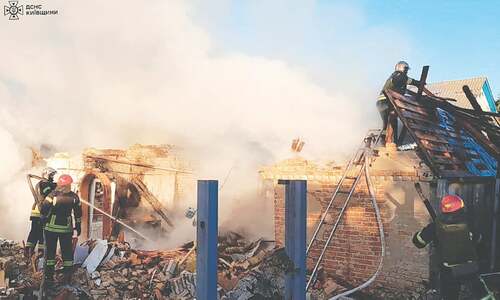
FOCA: Thousands of Muslims flocked to the town of Foca on Saturday for the reopening of a historic mosque levelled at the beginning of the Bosnian war, in a ceremony aimed at encouraging religious tolerance between deeply divided communities.
The 16th century Aladza Mosque was one of the most prominent masterpieces of classical Ottoman architecture in the Balkans before its destruction in the 1992-95 war by Bosnian Serb forces trying to carve out an ethnically “pure” state.
The mosque was listed as one of world heritage sites by Unesco, until the beginning of the war in Bosnia in 1992, when it was completely destroyed by Bosnian Serbs and it’s original stones were scattered in various locations, which made the restoration of the original structure impossible.
The eastern town of Foca became notorious for the mass persecution and killings of non-Serbs that took place there during the conflict.
Before the war, the Bosnian Muslims, or Bosniaks, made up 51 percent of its 41,000 residents with the remainder mostly Serbs.
Today, among some 18,000 residents, just over 1,000 Bosniaks remain.
“Everything that was connected to Islam, its civilisation or culture was destroyed,” said 65-year-old Muslim worshipper Sulejman Dzamalija.
Sacred items dumped on rubbish tips have been restored and built into the mosque “to mark the start of a new era in this part of the country,” he said.
Nestled in the valley by the Drina river, Aladza, also known as the Colourful Mosque, was one of 17 Ottoman mosques in Foca.
Five of them were destroyed during World War Two, while the 12 remaining were demolished during the 1990 war.
During the war, Bosnian Serbs authorities renamed the town Srbinje, but Bosnia’s top court ordered the reinstatement of the original name of Foca in 2004.
Muhamed Jusic, the Foca assembly speaker, said the reconstructed mosque offered hope for the return of pre-war residents and “a new beginning in Foca”.
Twenty four years on from the devastating war between its Muslim Bosniaks, Orthodox Serbs and Catholic Croats, Bosnia remains split along ethnic lines, with rival groups blocking reconciliation and reform needed to join the European Union.
“Today we are witnessing a hope that people will again find peace at this place,” the head of Bosnia’s Islamic Community Husein Kavazovic said at the ceremony.
Work on rebuilding the mosque started in 2012 and was financed by the governments of Turkey and the United States.
“Aladza should serve as a monument to resilience, reconciliation and diversity,” said US Ambassador Eric Nelson.
Turkish Culture Minister Mehmet Nuri Ersoy said reopening of the mosque demonstrates that “racism and hatred can make material damage but cannot destroy culture of non-existence nourished for centuries”.
Published in Dawn, May 5th, 2019
















































Dear visitor, the comments section is undergoing an overhaul and will return soon.